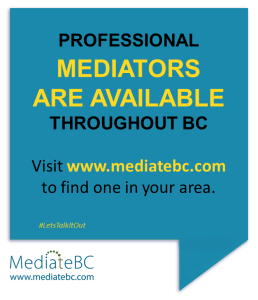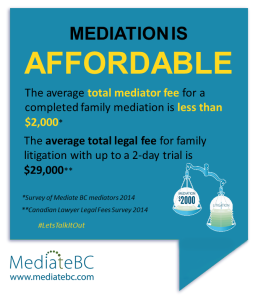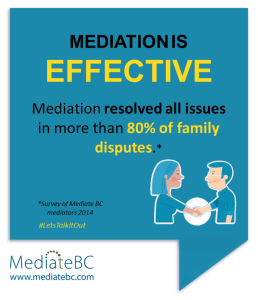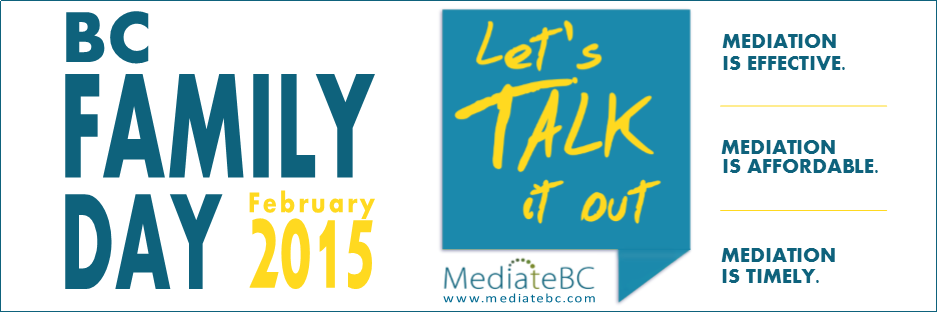If I am a mediator, but not a practicing lawyer in BC, when do I cross the line into the “practice of law”? What does that line look like? Is there a line at all? How does this affect how I practice mediation and serve my clients?
These are thorny questions. They are not new and mediators in BC and abroad have been struggling with them for decades.
Over the years, the Law Society of BC has received complaints that mediators have crossed the line and, in some cases, has sought ‘undertakings’ from these mediators that they will change their activities and in other cases has applied to the Supreme Court for an injunction prohibiting that mediator from engaging in the practice of law.
Mediate BC’s Rosters include mediators from a wide variety of backgrounds and we celebrate this diversity and the range of services that are available to BC citizens to resolve their disputes. Mediate BC wants to support Roster mediators by helping to clarify what the “practice of law” means to them and how to avoid a Law Society complaint.
We are pleased to advise that the Law Society of BC has recently released an “Information Bulletin” entitled the “Unauthorized practice of law” which tackles this issue directly.
LSBC Info Bulletin Unauthorized Practice of Law
The bulletin highlights the situations involving particular risk:
- Advising mediation participants on the law or their legal rights
- Drafting enforceable contracts (including advice on how to structure their agreement)
While this bulletin is helpful, we see it as only the first step of a dialogue, first with the BC mediation community, and then with the Law Society of BC. Mediation is a key part of an effective access to justice strategy and the Law Society of BC supports the creation of new categories of “legal service providers” (regulated by the Law Society). So an important additional question needs to be addressed: How, and to what extent, can BC mediators who are not practicing lawyers provide services to the public that would, under the current definition, be considered the “practice of law”?
Mediate BC is organizing a community dialogue process over the next several months to discuss the Information Bulletin and these other important questions. We are very keen to obtain your input and ideas. Please watch for more information about dates/times/locations for these sessions.
Thank you,
Kari D. Boyle
Executive Director, Mediate BC
 Mediate BC has a roster of family mediators who have met our stringent requirements in:
Mediate BC has a roster of family mediators who have met our stringent requirements in:
- Training (mediation, family dynamics, safety screening, etc.)
- Experience (experience as a family mediator)
- Professionalism (adhering to our Standards of Conduct, ongoing professional development and more)
If you need a family mediator in BC, visit our Family Mediator Roster where you can search based on your location, the specific issues to your case, cost and other factors. Our Roster Program staff and Roster mediators would be happy to assist you in determining if mediation is right for you.
Mediate BC is hosting a panel discussion with family mediators in Surrey on February 17, 2015 and our  family mediators are in Provincial Courthouses across the province providing information about family mediation to those engaged in the process of separation and divorce.
family mediators are in Provincial Courthouses across the province providing information about family mediation to those engaged in the process of separation and divorce.
For a full listing of information table locations, dates and times, please click here.

Legal disputes in the court system can take months or even years to complete. The longer a family dispute takes to resolve the higher the financial and emotional toll on the family. This is where mediation can help.
A Department of Justice Canada study in 2007 found that cases which included mediation resolved about 5 months faster than those which did not. That’s 20 weeks, or 140 days of less stress and emotional turmoil a person would have to endure and time that could be spent moving forward.
Mediation is available any time – even before court action is started.
Mediate BC is hosting a panel discussion with family mediators in Surrey on February 17, 2015 and our family mediators are in Provincial Courthouses across the province providing information about family mediation to those engaged in the process of separation and divorce.
Today, family mediators are providing information in Provincial Courthouses in:
- Richmond (7577 Elmbridge Way, 9:00am – 4:00pm)
- Surrey (14340 – 57th Ave., 9:00am – 4:00pm)
- Victoria (850 Burdett Ave., 9:00am – 12:00pm)
For a full listing of information table locations, dates and times, please click here.

The Mediate BC Mediator Survey 2014 showed just how much more affordable family mediation can be on average when compared to litigation. The survey found that average total mediation fees were less than $2,000 ($1,784 to be precise). Since parties usually share this total cost, the average cost to each party to a mediation would be less than $1,000.
The 2014 Canadian Lawyer magazine fee survey found that the average total legal fees for a family court case up to and including a two-day trial were $14,500 per party (or $29,000 total).
While not all court cases will end up in a two-day trial and mediation time can vary by the number and complexity of the issues, the difference is significant. Mediation can be a much more affordable option for families.
Mediate BC is hosting a panel discussion with family mediators in Surrey on February 17, 2015 and our family mediators are in Provincial Courthouses across the province providing information about family mediation to those engaged in the process of separation and divorce.
Today, family mediators are providing information in Provincial Courthouses in:
- Kamloops (455 Columbia St., 9:00am – 12:00pm)
- Salmon Arm (550 – 2nd Ave., 9:00am – 12:00pm)
For a full listing of information table locations, dates and times, please click here.

The Mediate BC Mediator Survey 2014 found that over 90% of mediations resolved all issues or helped the parties move towards resolution. These resolution rates were particularly high in family mediations where:
- 81% Resolved all issues
- 17% Did not resolve all issues, but assisted the parties to move towards resolution
The benefits of family mediation were also revealed in participant satisfaction rates:
- 93%: Average satisfaction rate with the process*
- 85%: Average satisfaction rate with the outcome*
*Includes mediation satisfaction of family, civil and workplace mediations.
Why is family mediation so successful in resolving issues and satisfying participants? Reasons include:
- Families are the ones in control of creating the solution. Mediators assist, or facilitate, the two parties to engage in productive dialogue and agree on what will work for them. The decisions are made by the parties (family members) not by the mediators.
- Family mediation is affordable (more on this tomorrow).
- Family mediation is timely (more on this later this week).
- Family mediation is safe, confidential and can help to preserve good relationships.
- Family mediation is flexible and can be conducted safely and effectively using technology tools in appropriate cases
- Family mediation can result in creative solutions tailored to the family’s needs.
Mediate BC is hosting a panel discussion with family mediators in Surrey on February 17, 2015 and our family mediators are in Provincial Courthouses across the province providing information about family mediation to those engaged in the process of separation and divorce.
Today, family mediators are providing information in Provincial Courthouses in:
- Kelowna (1355 Water St., 9:00am – 3:30pm)
- Surrey (14340 – 57th Ave., 9:00am – 4:00pm)
For a full listing of information table locations, dates and times, please click here.

Separation and divorce usually rates increase in the first month of each year, which can cause stress for families at the time BC celebrates Family Day. To meet that need, Mediate BC is hosting a panel of experienced family mediators to provide information about how mediation can assist families to transition through separation and divorce without the need to go to court. Family Roster mediators Brenda Hooper and Kevin Moye, Family Justice Counselor Elissa Dehgan and Legal Advocate Ram Sidhu will be on hand to discuss options and the mediation process as well as to answer questions.
Other community resources will be participating to let families know about the additional resources and services available in their community.




This free public event will be interactive with lots of time for discussion and questions, so it is an ideal option for those who are trying to work through some difficult family issues.
For more information and to register please visit us here. You can download the event poster here.
Mediate BC’s experienced local family mediators will also be in Provincial Courthouses across the province to provide information to families engaged in the process of separation and divorce. For a listing of participating communities, dates and times please visit the Mediate BC website.
Generously funded by the Law Foundation of BC.
Family mediators should be aware of the new federal legislation about family homes on reserve: The Family Homes on Reserve and Matrimonial Interests or Rights Act. The is a great start and LSS’s Aboriginal Legal Aid BC website also provides helpful resources and information.
Thank you!
We are very pleased to advise that the Comite Des Organismes Accrediteurs en Mediation Familiale (Quebec) has published on its website a translated version of Mediate BC’s Distance Mediation Practice Guidelines.
These guidelines were a key deliverable from our Distance Mediation Project, a six-year research initiative funded by the Law Foundation of BC, that explored the use of technology-assisted family mediation (focusing on separation and divorce issues). Find out more about the Distance Mediation Project here.
Confidentiality is a key benefit of mediation (compared to a public court process). However, the principle of  “confidentiality” is not well understood and often confused with “privilege” or “privacy” issues. In his Slaw post today (January 15 2015), Michael Erdle tackles this important issue by discussing two recent Canadian decisions: the Supreme Court of Canada decision in Union Carbide Inc. v. Bombardier Inc. and Jan Wong v. The Globe and Mail Inc, a decision of the Ontario Superior Court of Justice.
“confidentiality” is not well understood and often confused with “privilege” or “privacy” issues. In his Slaw post today (January 15 2015), Michael Erdle tackles this important issue by discussing two recent Canadian decisions: the Supreme Court of Canada decision in Union Carbide Inc. v. Bombardier Inc. and Jan Wong v. The Globe and Mail Inc, a decision of the Ontario Superior Court of Justice.
As Michael notes at the end of his post, it is critically important that mediators discuss with mediation participants:
– the wording of the Agreement to Mediate which spells out the extent to which the parties contract to keep information confidential (including situations in which one party may take steps to enforce an eventual agreement); and
– the eventual Settlement Agreement which should explicitly describe what, if anything, will be “confidential” and what happens if one party breaches those terms.
One last point: the Settlement Agreement (like any formal contract) should also include robust and well-considered provisions describing what happens if there is a dispute between the parties about the agreement (a dispute resolution clause – including mediation of course!).
This is a good time to review your standard wording. Let us know what you come up with!
Kari D. Boyle, Executive Director, Mediate BC Society
Image courtesy of Stuart Miles at FreeDigitalPhotos.net
Curiosity.
You can’t have a real conversation without curiosity. It can lead to creative and innovation approaches to conflict and open a pathway to resolution.
We all know this but I wonder how many conflict resolvers make a concerted effort to identify and uncover their own assumptions and to be open to the possibility that they might be wrong. Owning up to our errors gives us opportunities to learn new things.
They didn’t teach us this at law school!
Good news for 2015 – it is not too late to learn how to be genuinely curious. If you are looking for a simple, step-by-step method of honing your curiosity I encourage you to take a look at a new book by my friends and colleagues Kathy Taberner and Kirsten Taberner Siggins: The Power of Curiosity – How to Have Real Conversations That Create Collaboration, Innovation and Understanding. Their website offers the opportunity to read all of Chapter One for free. I think you will be hooked.
The examples in the book range from business, leadership, coaching, personal relationships and parenting situations. This is a skillset that transcends the context.
I’m curious to find out your feedback about this book as you apply its approach in 2015.
From everyone at Mediate BC, a very Happy New Year!

 family mediators are in Provincial Courthouses across the province providing information about family mediation to those engaged in the process of separation and divorce.
family mediators are in Provincial Courthouses across the province providing information about family mediation to those engaged in the process of separation and divorce.







 “confidentiality” is not well understood and often confused with “privilege” or “privacy” issues. In his
“confidentiality” is not well understood and often confused with “privilege” or “privacy” issues. In his